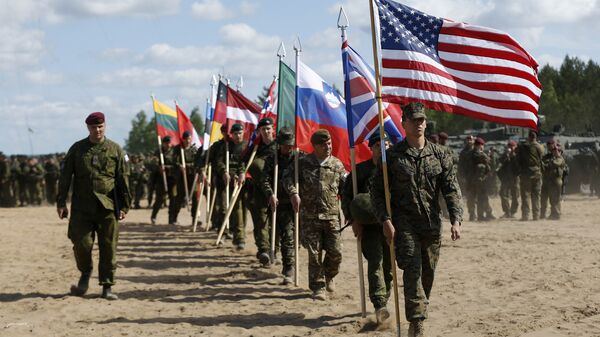Sturmer referred to Russian Prime Minister Medvedev's address at the Munich Security Conference in February, when he complained that "The political course of NATO remains, in our estimation, closed and hostile in relation to Russia."
"You can put it more sharply: we have, in essence, sunk to a time of new Cold War. Almost every day we are declared the most frightening danger for NATO as a whole, or separately for Europe, or for America and other countries."
"They film scary films in which Russians start nuclear wars. Sometimes I wonder, are we living in 2016 or 1962?" Medvedev said.
Sturmer wrote that this adversarial depiction of Russia is a consequence of the lack of strategy in US foreign policy, beyond a desire to expand for expansion's sake, and that this aimlessness has brought new dangers since 1990.
US forces stationed in Europe during the Cold War were "both hostage and guarantee that the US was honest in its intentions. In retrospect, 1990 was the end of a long nuclear peace, and of a world power cartel of war aversion," Sturmer wrote.
"In a word: the Cold War was better than its reputation. The rules were set out in the conventions on arms control and ranged from reciprocal inspections of nuclear weapons to confidence and security building measures in the conventional [weapons] sector."
Since the Cold War NATO has been left without a convincing purpose, and is claimed variously to exist to prevent emergencies, make deterrence credible and provide security; "strategic orientation and political purpose have not matched for a long time."
Sturmer wrote that while NATO claimed to be the answer to security concerns, its expansion to the east came with military waivers: no nuclear weapons, no stationing of troops, no permanent military installations. This was a "hollow expansion" which nonetheless failed to convince Russia of its contribution to stability in Europe.
"NATO's eastern expansion was on paper, but not on the terrain. Was Russia the biggest foe or best friend? One couldn't and didn’t want to decide."
"But has a big strategy been developed? There appears to be little that is guiding, using and limiting such power," Sturmer wrote, quoting recent criticism from US national security analyst Anthony Cordesman.
"The US have no clear strategy for handling Russia and Asia," Cordesman said.
"They merely react tactically to the immediate pressure of events in the Middle East and Afghanistan, without clear goals or direction."
"Even worse is that the military-tactical reactions are less and less orientated to the need to develop the general concept of a civil military." This would look beyond the satisfaction of short-term military capitulation and aim to establish control and structure.
"The Europeans cannot say they weren't warned," Sturmer concluded.




